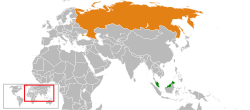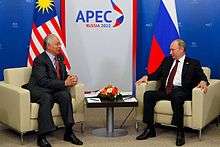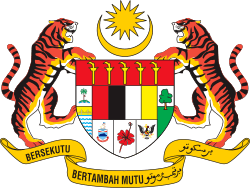Malaysia–Russia relations
 | |
Malaysia |
Russia |
|---|---|
| Diplomatic Mission | |
| Malaysian Embassy, Moscow | Russian Embassy, Kuala Lumpur |
| Envoy | |
| Ambassador Mat Dris Yaacob | Ambassador Valery N. Yermolov |
Malaysia–Russia relations (Malay: Hubungan Malaysia–Rusia; Jawi: هوبوڠن مليسيا–روسيا; Russian: Малайзийско-российские отношения Malayziysko-rossiyskiye otnosheniya) refers to bilateral foreign relations between the two countries, Malaysia and Russia. Russia has an embassy in Kuala Lumpur (from April 1968),[1] and Malaysia has an embassy in Moscow (from November 1968).[2]
History
Colonial era
As part of the World War I, Russian cruiser Zhemchug was sunk by German SMS Emden off Penang in the British Straits Settlements.[3] Some Malay fishermen risks their own lives to rescue any surviving crews from the cruiser.[4]
Soviet era
The Soviet Union established diplomatic relations with Malaysia on 3 April 1967 along with the signing of a trade agreement.[5][6][7][8] Following the opening of official trade relations between the two countries, the Soviet Trade Representation was established in November 1967.[9] In 1970, the first group of Soviet students came to study Malay at the University of Malaya, among them Tatiana Dorofeeva, Tamara Reshetova, Victor A. Pogadaev and Anatoly Voronkov[10].
Ties between the two suffered when Malaysia declared its support for Islamic Unity of Afghanistan Mujahideen against the Soviet invasion to backup the Democratic Republic of Afghanistan throughout the 1980s.[11][12] During the time, Malaysia also joining the US-led boycott of the 1980 Summer Olympics to expressed their opposition from such invasion to Islamic countries.[13][14] Throughout the Cold War, the relations are made cautious by Malaysia over the Soviet role in the Vietnam War and Soviet intervention in the Indian Ocean which may could lead to the domino theories as the nation had already and was struggling with three Communists insurgency itself; such as the Malayan Emergency, Second Malayan Emergency and Sarawak Communist Insurgency.[15]
However, relations between the two recovered following the conflict's end, and both countries have since put aside historical disputes and worked to repair diplomatic, economic, and military ties. Several Malaysian Prime Ministers have made official visits to Moscow, such as by Tun Abdul Razak in 1972, Tun Hussein Onn in 1979 and Mahathir Mohamad in 1987.[8] Since Mikhail Gorbachev came to power in 1985, relations between the two countries have improved significantly with Mahathir met Gorbachev several times.[16][17] The close relations are being maintained until the dissolution of the Soviet Union on 26 December 1991.
Modern Russia


In the modern times, several visits have been made between each other leaders.[18] Tuanku Ja'afar made an unofficial visit to St. Petersburg in May 1997.[8] In 1999, Mahathir made a working visit to the Russian regions of Khabarovsk Krai and Buryatia. Another visit by Mahathir to Moscow was made in 2002.[19] At the Asia-Pacific Economic Cooperation (APEC Summits) in Brunei (November 2000) and Shanghai (October 2001) and Group of Eight (G8 Summit) in Evian (June 2003), there were informal meetings between Russian President Vladimir Putin and Malaysian Prime Minister Mahathir.[8]
Putin visited Malaysia twice in 2003 (on an official visit in August) and to attend the Organisation of Islamic Cooperation (OIC) Summit in October. During his official visit, Putin conferred the Order of Friendship to Mahathir in recognition of his contribution to strengthening the friendly ties between the two countries and to the cause of global stability and inter-religious accord while a contract was signed to supply the Royal Malaysian Air Force (RMAF) with 18 Russian Sukhoi Su-30MKM fighter aircraft.[20] Another visit from Malaysia was made by Tuanku Sirajuddin in September 2005. Putin participated in the first Russia-ASEAN Summit in Kuala Lumpur and had a bilateral meeting with Malaysian Prime Minister Abdullah Ahmad Badawi in December 2005. Abdullah later made an official visit to Moscow in June 2007.[8] Mahathir considered Russia to become a future rival to the United States and Israel and praised Putin for criticizing and standing up to American and Western interference in other sovereign states.
In 2012, the next Malaysian Prime Minister Najib Razak met Putin during the Asia-Pacific Economic Co-operation in Russia to expanding trade relations and discovering other opportunities of business partnership.[21] Another meeting was held in 2016 to expanding business ties to provide better connectivity, including establishing direct flights and exploring a free trade agreement (FTA) deal to enhance bilateral trade and tourist arrivals.[22]
Economic relations
On 4 October 1972, the Agreement on Economic and Technology Co-operation was signed. In 2012, around 40,000 Russian tourists visiting Malaysia which are to be expanded with the establishment of better connectivity and direct flights between the two countries.[21][22] Trade between the two countries in 2016 valued around US$2.2 billion.[18] On 15 March 2016, a Russia-Malaysia business council was established to strengthening collaboration in economy, science, technology and culture.[23][24]
Security relations and collaboration in science field
On 19 May 2007, Jamaluddin Jarjis of Malaysia's Minister of Science, Technology and Innovation announced that two Malaysian final candidates for astronauts (Faiz Khaleed and Sheikh Muszaphar Shukor) will be undergoing training in Moscow as part of the billion-dollar deal for 18 Sukhoi Su-30MKM fighter jets.[25][26][27] These astronauts brought along cancer cells, bacteria and protein for studies in space.[26][28] One of the two candidates, Sheikh Muszaphar succeed in the training and sent to the International Space Station (ISS) as part of the Angkasawan program for the Malaysian National Space Agency (MNSA) and the Russian Federal Space Agency (Roscosmos).[29] The mission was a success and Sheikh Muszaphar became the first Malaysian national in space.[30] In 2016, Malaysia said it is acknowledging Russia's strength in military industry and aerospace and their help in those sectors, expressing intention to expand collaboration more further.[21] In 2018, Russia set up their branch office of the Russian Centre of Science and Culture (RCSC) in Kota Kinabalu to expanding the existing co-operation between Malaysia and Russia in the culture, economic and education spheres.[31][32]
References
- ↑ Малайзия (in Russian). Ministry of Foreign Affairs, Russia. Archived from the original on 14 June 2011. Retrieved 16 May 2008.
- ↑ "Official Website of Embassy of Malaysia, Moscow". Ministry of Foreign Affairs, Malaysia. Retrieved 29 December 2017.
- ↑ Dina Murad (28 June 2014). "The Battle of Penang". The Star. Retrieved 29 December 2017.
- ↑ Ajay Kamalakaran (20 May 2015). "Battle of Penang: When Malay fishermen rescued Russian sailors". Russia Beyond the Headlines. Retrieved 29 December 2017.
- ↑ George Ginsburgs; William B. Simons (1988). The Soviet Union and International Cooperation in Legal Matters: Recognition of arbitral agreements and execution of foreign commercial arbitral awards. Martinus Nijhoff Publishers. pp. 73–. ISBN 90-247-3677-3.
- ↑ Victor Sumsky; Mark Hong; Amy Lugg (30 May 2012). ASEAN-Russia: Foundations and Future Prospects. Institute of Southeast Asian Studies. pp. 185–. ISBN 978-981-4379-57-1.
- ↑ Leszek Buszynski (13 September 2013). Soviet Foreign Policy and Southeast Asia (Routledge Revivals). Routledge. pp. 12–. ISBN 978-1-134-48085-2.
- 1 2 3 4 5 "Russian-Malaysian Relations". Embassy of the Russian Federation in Malaysia. Retrieved 29 December 2017.
- ↑ Translations on South and East Asia. Joint Publications Research Service.
- ↑ “From Behind the ‘Iron Curtains’ to the ‘Free World’ in the Search for Knowledge”. – “Mahasiswa Negara”, Kuala Lumpur, September 1970, Jilid 8, Bilangan 7
- ↑ Hussin Mutalib (1993). Islam in Malaysia: From Revivalism to Islamic State?. NUS Press. pp. 14–. ISBN 978-9971-69-180-6.
- ↑ Shanti Nair (11 January 2013). Islam in Malaysian Foreign Policy. Routledge. pp. 180–. ISBN 978-1-134-96099-6.
- ↑ Samantha Khor (3 February 2016). "Road To Moscow 1980: The True Story Of Malaysia's Football Team That Inspired 'Ola Bola'". Says.com. Retrieved 29 December 2017.
- ↑ Zainul Arifin (8 February 2016). "Memories of Malaysian football". New Straits Times. Retrieved 29 December 2017.
- ↑ Christoph Marcinkowski; Constance Chevallier-Govers; Ruhanas Harun (2011). Malaysia and the European Union: Perspectives for the Twenty-First Century. LIT Verlag Münster. pp. 40–. ISBN 978-3-643-80085-5.
- ↑ "Mahathir accepts Gorbachev invitation". The Straits Times. National Library Board. 3 November 1985. p. 9. Retrieved 29 December 2017.
- ↑ Leszek Buszynski (11 April 2014). Gorbachev and Southeast Asia (Routledge Revivals). Taylor & Francis. pp. 113–. ISBN 978-1-134-48064-7.
- 1 2 Sergei Lavrov (1 June 2017). "Celebrating 50 years of Russia, Malaysia relations". New Straits Times. Retrieved 29 December 2017.
- ↑ "Press Statement following Talks with Malaysian Prime Minister Mahathir Mohamad". President of Russia. 14 March 2002. Retrieved 29 December 2017.
- ↑ "President Vladimir Putin held negotiations with Malaysian Prime Minister Mahathir Mohamad". President of Russia. 5 August 2003. Retrieved 29 December 2017.
- 1 2 3 "Pertemuan Najib, Putin buahkan hasil" (in Malay). Kosmo!. 9 September 2012. Retrieved 29 December 2017.
- 1 2 "Najib and Putin meet to talk trade and tourism". Bernama. The Malay Mail. 20 May 2016. Retrieved 29 December 2017.
- ↑ Alexander Korablinov (16 March 2016). "Russia, Malaysia establish business council". Russia Beyond the Headlines. Retrieved 31 December 2017.
- ↑ "Business council set up to boost Malaysia – Russia cooperation". Vietnam News Agency. Vietnam+. 16 March 2016. Retrieved 31 December 2017.
- ↑ "Malaysian Astronauts Head To NASA For Training". Agence France-Presse. Terra Daily. 20 May 2007. Retrieved 29 December 2017.
- 1 2 "Malaysian astronaut to conduct cancer research in space". Mint. 4 July 2007. Retrieved 29 December 2017.
- ↑ Captain Faiz Kamaludin (10 February 2017). Astronaut Corps of Malaysia: The Selection Process. Partridge Publishing Singapore. pp. 94–. ISBN 978-1-4828-8272-8.
- ↑ "First Malaysian astronaut to space". CCTV News. 21 September 2007. Retrieved 29 December 2017.
- ↑ "Malaysia's first astronaut to visit space station". New Scientist. 9 October 2007. Retrieved 29 December 2017.
- ↑ Chris Baldwin (21 October 2007). "First Malaysian astronaut returns to hero's welcome". Reuters. Retrieved 29 December 2017.
- ↑ Chok Sim Yee (22 February 2018). "Russian Centre of Science and Culture opening in KK". The Borneo Post. Archived from the original on 23 February 2018. Retrieved 23 February 2018.
- ↑ Ricardo Unto (22 February 2018). "Russians set up branch in KK". Daily Express. Archived from the original on 23 February 2018. Retrieved 23 February 2018.

